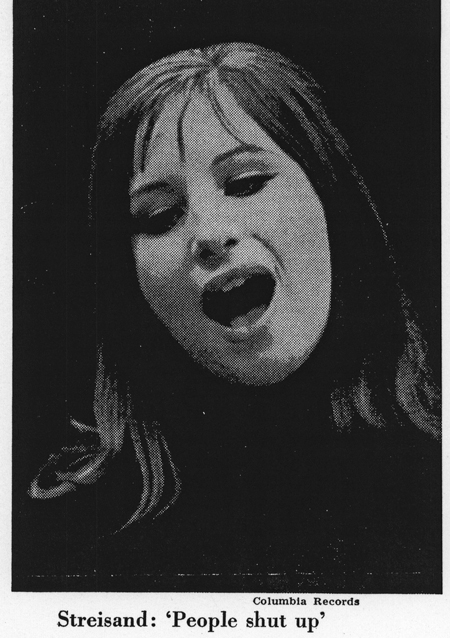
Newsweek
June 3, 1963
Bea, Billie, and Barbra
Barbra Streisand, a Brooklyn girl with small, sad eyes and an absurd nose, has, for a singer of 20, an absurdly gaudy following. Johnny Mercer, Harold Arlen, and George Abbott love her. Robert Ruark calls her "the hottest thing to hit the entertainment field since Lena Horne erupted." Her only Broadway show was last year's "I Can Get It for You Wholesale" and she showed up late 6 times. But its producer, David Merrick, still adores her; he wants her to play Fanny Brice in a biographical musical. "She's very extraordinary," gushes Truman Capote. "She is one of the real phenomenons of today. My favorites are Bea Lillie and Billie Holiday, and she's the only one I've heard equal to them."
The span from Bea Lillie's light lyrics to Billie Holiday's blues is broad, but Barbra’s strength is versatility. She is headed for an unprecedented triple crown of New York night life—hit stands in the basements, the barns, and the boîtes. In the Greenwich Village basements, like the Bon Soir, where she started two years ago, intimacy is the key, and when Barbra sings "My Coloring Book," the audience feels as though it is eavesdropping on her most private thoughts. In the jazzy barns, like Basin Street East, where she is currently appearing, singers are usually fighting trumpets and drunks, but when Barbra belts "Cry Me a River," she cows everyone into stunned contentment. “People shut up," she says. "What can I tell you?" In the fancy boîtes, like the Persian Room, where she opens in the fall, singers become song stylists, and when Barbra bursts into "Happy Days Are Here Again," sunshine floods her funny face and it is as though no one had ever sung the trite ditty before. Between songs, she throws in sly patter—kidding herself and her audiences—and snappy, sometimes macabre short numbers: "You better not shout, you better not cry, you better not pout, I'm telling you why—Santa Claus is dead."
Young Kook: Miss Streisand has always had a weakness for the offbeat. As a teen-ager, she colored her hair to fit her mood. As a budding actress, she told Lee Strasberg that her favorite actress was Rita Hayworth. "I didn't want to study with him," she explains. As a show-stopper in "Wholesale," she divorced herself from the play, reading Mad Magazine between her numbers. When friendly gossip columnist Earl Wilson caught her at the stage door one night, she told him to stop following her around. "You're a stage-door Johnny," she hollered, the shout echoing down Shubert Alley.
During her rise, reporters introduced her had the disconcerting feeling that they were interrupting in the middle of a conversation. A typical monologue would careen from malteds (she liked them) to lawsuits (she had them) to cut velvet (she wanted some) to horses (she bet them) to perfume (she could identify any one at twenty paces). She wanted stardom so that she could get a Rolls-Royce and drive it in sneakers.
Old Foggy: She is now a star, at least in nightclubs and on Columbia Records, but she does not have the new Rolls. She also does not quite have the old call to nuttiness. "I'm calmer," she says. "I'm much more depressed. My rose-colored glasses are fogged. Nothing impresses me as it did then. I'm an old married woman [last year, to 'Wholesale' star Elliott Gould]. Being talked about doesn't matter any more."
As a star, she has her share of detractors. "If you maintain a standard of work in order not to get knocked down for not maintaining a standard of work, then you get knocked down for being a prima donna," she says. "Now that I'm accepted on a mass level, I'm starting to get torn down. People always want a scene stealer. That's democracy! Most people don't really know when I'm good or bad, that's the sickest part of it."
Streisand knows when she's right. "I feel powerful then," she says with a grand sweep of her hand. "I feel ... I feel . . . like the queen." She is the first to admit that she doesn't look like "the queen. Her hair is now being done by Mr. Kenneth, but her face is hard to take seriously, and her figure is often encased in an unflattering high-waisted gingham tent—leading rumorists to blurt in print that she is pregnant.
"I get worried," she says, about such false reports. "Maybe they know something I don't know."
End.
[ top of page ]
